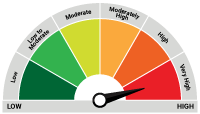RBI's Monetary Policy: 50bps Cut & Roadmap For Foreign Investment
Posted On Tuesday, Sep 29, 2015
Key takeaways from RBI's Monetary Policy meet today:
| • | RBI Cut Repo rate by 50 bps to 6.75% |
| • | Banks will have to reduce SLR (this is the % of deposits that banks invest in government bonds) by 0.25% every quarter |
| • | Foreigners can own up to 5% of outstanding government bonds by March 2018. |
| • | Indian companies allowed to issue INR denominated bonds (Masala Bonds) overseas with minimum 5 year maturity |
Our take on the move
The RBIs monetary policy was loaded with surprises, especially for the bond market. Few in the market expected a 50 bps cut in today’s policy. And it doesn’t end there, the RBIs inflation forecast of 4.8% for January-March 2017 quarter suggests further room for rate cuts in CY 2016.
The monetary policy review by also providing a 2 year road-map for foreign investment in government bonds and State Development Loans has ensured that government bonds will remain supported and banks can reduce their SLR holdings in a calibrated manner without market disruption.
Bond yields have fallen by close to 15 bps with the 10 year government bond yield trading below 7.60% and given that the overnight rate is now 6.75%, we would expect the yield of bondsto be on the lower end due to attractive term spreads and potential demand from foreigners.
What triggered the 50 bps move?
We expected a 25 bps cut in this review to leave the Repo rate at 7.0% and then pushed out the next two possible rate cuts beyond April 2016. Our view was based on the premise that the January 2016 CPI inflation target of 6% will be met comfortably.RBI would then move its inflation target lower to 5.0% by January 2017. For the Repo rate to move to 6.5%; it would require CPI inflation to average 5.0%, thereby maintaining the 1.5% Real Repo rate spread.
So the RBI has moved its inflation target to 5.0% January 2017; but
| 1. | It now expects average inflation for April 16-March 17 at 5.5% sees the January – March 2017 CPI inflation at 4.8%. |
| 2. | It has taken the recent global developments into consideration, especially the further drop in commodity prices in the backdrop of global growth slowing down. |
This has allowed them to 'front-load' some accommodation and hence we have seen a 50 bps cut. The thing to note is many economists had suggested that the 'Terminal Repo' (final repo rate for this rate cut cycle) would be 7.0%. But in just 9 months in this rate cutting cycle, the Repo rate stands lower by 1.25% at 6.75%. That just shows the extent of dis-inflation seen in the Indian and global economy in 2014/15.
Foreigners get a larger play with certainty as they can now invest INR1.2 trillion by March 2018. They would also be able to invest around INR500 billion by March 2018 in state government papers.
This is a significant move and allows foreign investors a certain and greater play in the Indian bond markets. Given that India currently remains an attractive destination amongst its Emerging Market (EM) peers and that global investors are significantly under-invested in Indian fixed income this will support G sec yields to go down.
Guidance
With this 50 bps move; we expect further rate moves only post April 2016. By then, the fiscal policy for FY 17 would be clear and the initial monsoon forecasts would have been released. If the fiscal policy is favorable and one which provides comfort to meet the 5% January 2017 target, we should expect a further 50 bps rate cut in CY 2016.
From now the 1 year T-bill rate is the benchmark for calculating real interest rates, instead of the overnight Repo rate. In easy liquidity conditions, the 1 year T-Bill generally trades around 25 bps spread over Repo.
One major reason for INR stability has been the combination of the reduction in India's inflation differential with the developed world and the emergence of positive Real interest rates thus reducing the INR risk premium.
All of the above suggests to us that Indian fixed income continues to remain attractive and investors should remain invested and/or increase their allocations.
Source: RBI
Product Labeling
| Name of the Scheme & Primary Benchmark | This product is suitable for investors who are seeking* | Risk-o-meter of Scheme |
| Quantum Dynamic Bond Fund An Open Ended Dynamic Debt Scheme Investing Across Duration | • Regular income over short to medium term and capital appreciation • Investment in Debt / Money Market Instruments / Government Securities. |  Investors understand that their principal will be at Moderate Risk |
* Investors should consult their financial advisers if in doubt about whether the product is suitable for them.
Disclaimer, Statutory Details & Risk Factors:
The views expressed here in this article / video are for general information and reading purpose only and do not constitute any guidelines and recommendations on any course of action to be followed by the reader. Quantum AMC / Quantum Mutual Fund is not guaranteeing / offering / communicating any indicative yield on investments made in the scheme(s). The views are not meant to serve as a professional guide / investment advice / intended to be an offer or solicitation for the purchase or sale of any financial product or instrument or mutual fund units for the reader. The article has been prepared on the basis of publicly available information, internally developed data and other sources believed to be reliable. Whilst no action has been solicited based upon the information provided herein, due care has been taken to ensure that the facts are accurate and views given are fair and reasonable as on date. Readers of this article should rely on information/data arising out of their own investigations and advised to seek independent professional advice and arrive at an informed decision before making any investments. Please visit – www.quantumamc.com/disclaimer to read scheme specific risk factors.
Related Posts
-

Looking Beyond the 10-Year Benchmark: Decoding India’s Bond Market Signals
Posted On Thursday, Feb 26, 2026
If you glance at India’s financial headlines today, the tone feels reassuring.
Read More -

From Storage to Circulation
Posted On Thursday, Feb 26, 2026
From Storage to Circulation: Can Total Return Swaps Transform India’s Corporate Bond Market?
Read More -

Gold Monthly for February 2026
Posted On Tuesday, Feb 03, 2026
Gold began the new year on a strong footing, carrying forward the momentum from the previous year and extending its upward rally.
Read More



